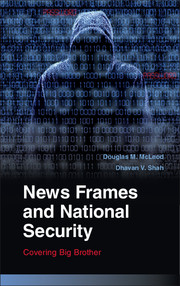2 - Framing Surveillance and the War on Terror
Published online by Cambridge University Press: 18 December 2014
Summary
“While our job is not finished, we have used the tools provided in the Patriot Act to fulfill our first responsibility to protect the American people. We have used these tools to prevent terrorists from unleashing more death and destruction on our soil. We have used these tools to save innocent American lives. We have used these tools to provide the security that ensures liberty.”
– John Ashcroft Former U.S. Attorney General August 19, 2003“The tour that the attorney general has started suggests that they’ve had enough criticism of what they’ve been doing that they’ve found it necessary to actually go out and defend the PATRIOT Act, with all of its intrusive measures. All the violations of people’s privacy, doing things without the supervision of a court, doing things in a warrantless fashion, many of the things that are banned by our Bill of Rights, they’re doing it.”
– Larry Pratt Executive Director of Gun Owners of America August 21, 2003Following the events of September 11, 2001, a core issue that lay dormant beneath the surface of everyday politics roared to life, confronting policymakers, journalists, activists, and citizens with what has arguably been the central civic dilemma of the new millennium. How do we strike an appropriate balance between concerns about guarding citizens against future acts of terrorism, while minimizing infringements on civil liberties? The Bush administration and certain members of Congress argued that fundamental changes in intelligence gathering and law enforcement were necessary to protect national security, an assertion that resulted in both the founding of the U.S. Department of Homeland Security and the passage of the USA PATRIOT Act in October of 2001. The latter initiative has prompted serious criticism from both policymakers and activists, who assert that certain provisions compromised established civil liberties of American citizens. Indeed, evidence has accumulated that government agencies substantially overstepped the expanded powers of the PATRIOT Act, engaging in illegal surveillance activities. This dilemma, and the conflict that has unfolded around it, form the central issue of this book.
- Type
- Chapter
- Information
- News Frames and National SecurityCovering Big Brother, pp. 38 - 80Publisher: Cambridge University PressPrint publication year: 2014



